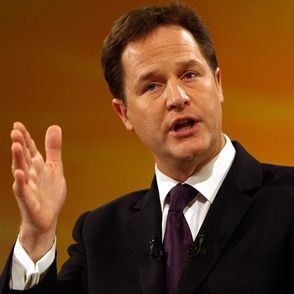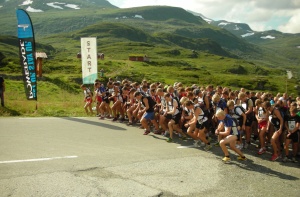 Had my instincts of self-preservation compelled me to do so, I’d have looked up the advice pages on wordpress and somewhere there discovered guidance on those topics that single, white, middle-aged men should on no account commit to blogging about.
Had my instincts of self-preservation compelled me to do so, I’d have looked up the advice pages on wordpress and somewhere there discovered guidance on those topics that single, white, middle-aged men should on no account commit to blogging about.
At the very top of that list of pages my eyes may have fallen upon a solitary entry listed, “WOMEN”.
I am, however, perilously lacking in this respect and I’m not likely to ignore a week of news dominated at every turn by women.
The week started as the previous one had ended. Sky sports presenter’s Andy Gray and Richard Keys were making the headlines following their sexist comments against female assistant referee, Sian Massey. By Wednesday they were gone; Gray having been sacked the day before followed by Keys who resigned.
The two men had served at the helm of Sky’s premier league football commentary team since its inception 19 years ago. But they failed to acknowledge that in that time the country had moved on. Certain types of behaviour would no longer be tolerated. Revelations and accusations regarding the pair now seep daily from every pore of the media. It makes for painful reading with a capital Ouch.
Sky’s priority now is to rebuild the trust between it and its fee-paying audience, so perhaps they’ll plump for an anchorwoman to replace Keys. Top of any list must surely be the BBC sports presenter, Gabby Logan. Gabby is the daughter of former Leeds United midfield ace, Terry Yorath, and is as talented and knowledgeable about the game as they come.
Much further afield, In Egypt, pretty things have not been happening to the women there for a very long time. They have had it tough. Very tough. Last year, The Egyptian Centre for Women’s Rights (ECWR) published a report stating that the country ranked 125th out of 134 in a league of countries in relation to women’s rights.
The report, based on findings of International human rights organisations, found that of all violent crime recorded in Egypt last year, an astonishing 71.4% was perpetrated against women. 27 incidents of rape were recorded daily, though this was dwarfed by a separate report which claimed that 95% of rapes in the country go unreported.
Domestic violence in Egypt affects a startling 33% of the female population. The public groping of women is reported to be common in some parts of the country as is their sexual violation by police officers.
So it is not surprising then that in this context the streets of Cairo and other major Egyptian cities have been thronged with women protesting in favour of change. “Dirty government”, they complain, as they rein bottles down upon police officers from the balconies of their homes. Egypt is experiencing revolution and women are in the vanguard of its momentum.
Meanwhile, in Washington, I watched as the most powerful woman on the planet, Hilary Clinton, went live on TV and issued a warning to the Egyptian government that it should not use repressive measures to quell the popular uprising in the country. The inference was clear, the message emphatic.
Closer to home, Conservative MP, Dominic Raab, was creating mischief. He had an article published on the Politics Home website, also covered in detail by the Daily Mail, entitled, “We Must End Feminist Bigotry”. The 37 year old member for Esher and Walton complained that men were getting a “raw deal” given recent, anti-discrimination laws that were designed to favour women.
Of his many complaints, his determination that, “divorced or separated fathers are systematically ignored by the courts”, stood out for me. I am a single father who has been fortunate in that I have not had to go to court to gain access to my son; but I’m conscious that many fathers aren’t so fortunate, and many fail to succeed when they get there. The law’s interpretation of access rights for fathers is nothing short of a national disgrace.
Though, I’d much rather Dominic Raab hadn’t attempted to tackle issues that genuinely affect and concern men by attacking women and systematically promoting the idea that they have legal privileges exclusive to their gender. In doing so, his article fundamentally undermined his argument.
On Thursday, I was watching on TV as Theresa May listened thoughtfully to Dominic Raab as he delivered his second whine of the week about the topic; this time in the Commons.
“Labelling females as obnoxious bigots is not the way forward”, she retorted. The chastened Raab squirmed uncomfortably in his seat and feigned amusement, but the damage was done; the home secretary’s rebuke was cutting.
When he arrived home that evening, I can’t help but wonder if Dominic Raab made his way upstairs for a private moment alone in order to tentatively determine if all his particulars remained intact.
Last week saw Yvette Cooper, Labour’s newly appointed shadow home secretary, up against Theresa May; following the formers recent appointment. The shadow home secretary tore into the minister over plans to modify the time terrorist suspects may be held in custody without charge and questioned the home secretary’s administration of the process.
The ever impressive Cooper was, for once, outflanked by an increasingly confident Teresa May who clearly believes she has the measure of her latest, opposite number.
The articulate and passionate Cooper is the master of detail, has great resolve and is passionate in her delivery. May, in contrast, is calm, astute and seemingly a good reader of her adversary. I suspect there is, or will soon be, poor chemistry developing between the two. There may be trouble ahead and I intend to reserve an exclusive, front row seat.
It was declared last week that Stella Creasy, the Labour and Co-Operative MP for Walthamstow Forest, is to become Labour’s next prime minister. This is according to John Rentoul, the Independent on Sunday’s chief political commentator. “She comes across well and looks like a tory”, he said.
Passionate about her constituency and those whom she serves, she can be found on twitter providing regular updates of her busy, daily schedule.
Despite the entire London Transport system being at her disposal as well as the most technologically advanced mobile phone, computer device and software, none of these can quite keep up with the breakneck speed with which Stella Creasy tends to the challenge of moving seamlessly from one set of constituency appointments to the next. Her twitter feed would suggest that Apple, and the London underground network in particular, need to significantly up their game.
Whether Dr Creasy, a psychology graduate from LSE, is a prime minister in waiting is anyone’s guess. Personally, I think John Rentoul was having a slow news day and allowed his mind to wander during a slack schedule. He certainly did her no favours by describing her as someone who looks like a tory. What exactly does a tory look like, anyway?
All the same, I wouldn’t dare underestimate the Walthamstow MP. She appears to be making an impact in the Commons where she has introduced a Bill to combat the scourge of legal loan sharking. She has proved adroit at mobilising all parties to participate in the issues concerned with the Bill and appears to be making headway.
Meanwhile, Labour leader Ed Miliband didn’t get a mention from John Rentoul.
Finally, on Saturday morning, I almost choked on my Mornflake oats when I opened up my twitter feed to discover Dawn Purvis tweeting live…from Iraq. The independent MLA, the only remotely interesting politician in Northern Ireland’s Stormont Assembly, was attending a conference on the role of women in peace-building, reconciliation and accountability. Should this have surprised me? Probably not, but it did.
Sometimes in life you are given little warning signs that signal the likely occurrence of greater events to come. You can either dismiss this seemingly insignificant nuance or embrace it for what it represents. Last week just may be a signal that we’re soon to enter a phase in politics when women will dominate, impose themselves and make a significant contribution to all our futures.
This post is testimony to that theory and to claim my stake that we are soon to witness its dawn.
 Nick Clegg In usual Gobble-dee-gook mode
Nick Clegg In usual Gobble-dee-gook mode


